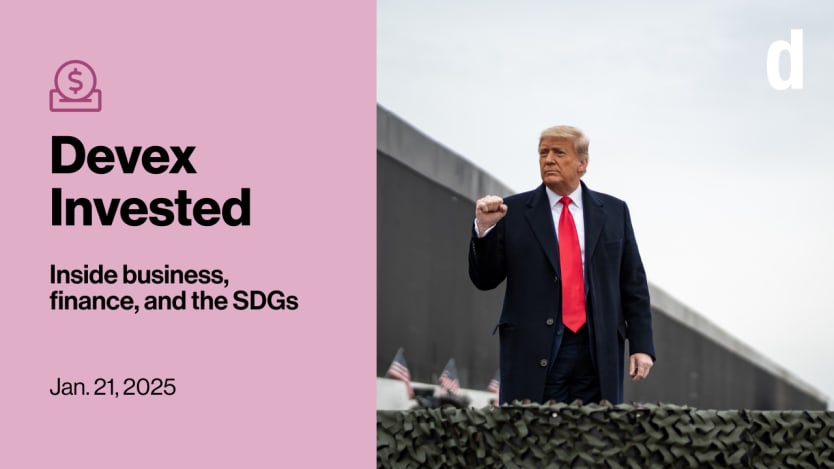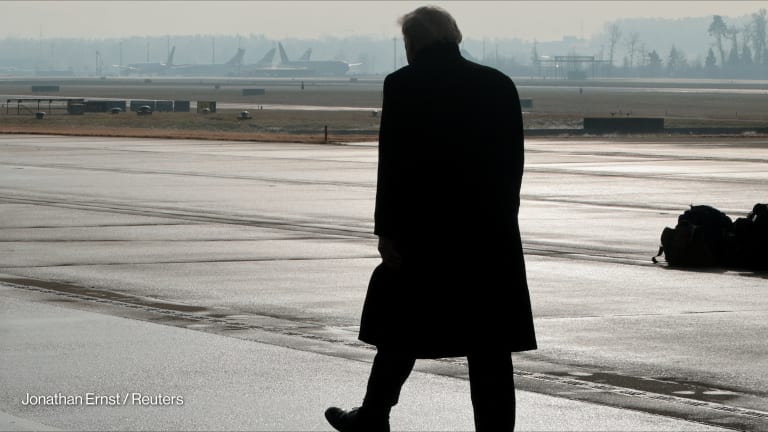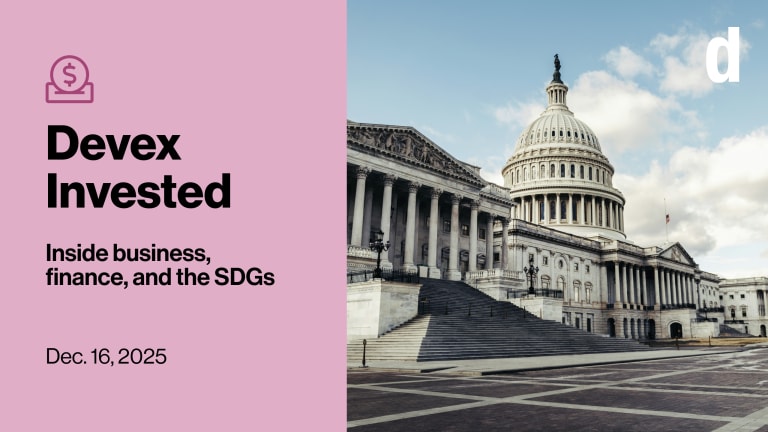
Donald Trump is back, using his return to the U.S. presidency Monday to begin withdrawing from the World Health Organization, the Paris climate agreement, and pausing all foreign aid for a 90-day review.
“The United States foreign aid industry and bureaucracy are not aligned with American interests and in many cases antithetical to American values,” the executive order on foreign aid states. “It is the policy of [the] United States that no further United States foreign assistance shall be disbursed in a manner that is not fully aligned with the foreign policy of the President of the United States.”
By far the Western world’s biggest donor — with $64.7 billion in official development assistance, or ODA, in 2023 compared to second-highest Germany’s $37.9 billion — the U.S. is now leading the global foreign aid system into uncharted territory.
Our reporters are covering what the Trump administration means for climate policy and USAID implementers, and you can expect more from us in the coming days.
Decoding Trump
Topics such as global health and climate change may face neglect, but it appears the U.S. International Development Finance Corporation, or DFC, could be in for a lot more attention.
Plans to boost DFC’s budget and countries of operation have been under discussion for months, but Bloomberg reported last week that Trump “has been involved in conversations over using it as a vehicle to invest in mines and other projects and to work closely with the Pentagon’s Defense Logistics Agency to build up reserves of critical minerals.” While investing in critical minerals and infrastructure is not new to DFC — it expanded its work in these areas in recent years, including through investments in the Lobito Corridor — how the administration leverages DFC is something to watch.
And join us tomorrow, Jan. 22, at 12:30 p.m. ET (6:30 p.m. CET) for an exclusive discussion with experts who will dive into what to expect in the first 100 days of Trump’s presidency — from foreign aid to multilateral relations.
Don’t miss the opportunity to hear from and post your questions live to:
• Morgan Martinez, vice president at InterAction.
• Porter DeLaney, founding partner at Kyle House Group.
• David Berteau, president and CEO at Professional Services Council.
Register now to be part of this critical conversation. If you can’t attend live, register and send in your questions anyway, and we’ll send you a recording!
Read: What will the presidential transition mean for US aid implementers? (Pro)
And don’t miss: Paris agreement in peril as Trump reenters White House
+ The event and the USAID implementers article are some of the exclusive benefits you get as a Devex Pro member. Not yet gone Pro? Start your 15-day free trial today and enjoy these perks and more. Check out all the exclusive content available to you.
Europe first
The Trump administration’s calls to ensure U.S. aid serves U.S. interests sound familiar to this reporter, who spent the past few years watching the European Union go down a similar path.
The European Commission is under fire from some members of the European Parliament and NGOs for what they say is undue focus on EU interests in (you guessed it) critical raw materials and energy supply, while neglecting least developed countries, or LDCs.
Plans to cut and consolidate development staff in EU delegations around the world into just 18 hubs — which we reported exclusively last week — won’t dispel that concern.
And even the chair of the usually donor-friendly OECD Development Assistance Committee put out a rare open letter last week, calling on the commission (which is the third-biggest ODA donor) to “prioritise those in extreme poverty.”
A small case in point? This tender, now open for submissions, in which the commission’s development department offers €3 million over three years to consultants to develop a network of European experts to analyze China’s “policies, progress and strategic investments on digital technologies” and advise the EU on how to respond.
We have asked the commission for comment on which budget line that falls under, and will keep you posted.
Read the scoop: EU wants development staff in regional hubs, not delegations (Pro)
ICYMI: EU risks legal action over failure to use aid to fight poverty, says top MEP (Pro)
No Spain, no gain
Into this tumultuous landscape, the upcoming Fourth International Conference on Financing for Development in Seville, Spain, is supposed to craft a new vision for development financing.
Catching our eye in the 29-page zero draft, released on Friday (i.e., before Trump’s return to power) by co-facilitators Zambia, Norway, Nepal, and Mexico:
• A request to the U.N. secretary-general “to create a working group to develop a set of principles on responsible sovereign lending and borrowing.”
• A commitment “to help build capacities, especially in developing countries, to access, develop, use and govern AI systems and direct them towards the pursuit of sustainable development.”
• A commitment to “promoting and strengthening the taxation of high-net-worth individuals, supported by international cooperation, while respecting national sovereignty.”
Whose priorities?
One area where the global north-south tension is playing out ahead of Seville? Blended finance.
“While many donor countries favour a more extensive use of blended finance instruments, many countries of [the] Global South highlight the risks and weak track record of these tools,” Sören Hilbrich, researcher at the German Institute of Development and Sustainability, tells us. “The zero draft deals with this divide by emphasising that blended finance initiatives should ‘focus on sustainable development impact, rather than on quantity or degree of leverage alone.’”
To 0.7%, and beyond
Another problem: The text calls on donors to “step up efforts to meet existing commitments,” including the (in)famous 0.7% of gross national income for ODA.
But that is “unrealistic to achieve,” Karim Karaki from the ECDPM think tank tells us, given that “several European member states are cutting their ODA budget and more are likely to follow given the current political and economic context.”
For Masood Ahmed, president emeritus at the Center for Global Development think tank, Seville is an opportunity to “move beyond” the trend of calling for more aid in theory while cutting aid budgets in practice.
“We should seize this moment to create a development finance system that maximises impact by aligning funding with goals designed and measured against their own unique metrics and objectives,” Ahmed tells us.
The chalet on the hill
And as Trump threatens to upend multilateralism (again), spare a thought for those high in the Swiss mountains at the World Economic Forum in Davos this week, trying to predict where the world goes in 2025.
Devex’s team is there and my colleague Elissa Miolene has this look at which topics are expected to dominate. Chief among them is artificial intelligence.
AI has great potential to drive economic growth in Africa, according to Chido Munyati, the head of WEF’s Africa program. However, Munyati adds, 43% of Africa’s population lacks access to electricity, and a query on ChatGPT requires 33% more energy than a basic Google search.
WEF President and CEO Børge Brende is still optimistic about AI, telling Devex President and Editor-in-Chief Raj Kumar that “Humanitarians like the International Committee of the Red Cross are now using AI to more accurately predict natural disasters and to detect anti-personnel landmines more effectively. The UN is using AI to strengthen supply chains for humanitarian aid, and UNICEF has even developed artificial intelligence models to predict and combat diseases such as dengue fever in subtropical countries.”
Read: World Economic Forum president and CEO on development’s role in Davos
Plus: Development at Davos — here’s what to watch
+ If you haven’t already, sign up for our daily Devex Newswire and get Elissa’s special Davos newsletter detailing the chalet play-by-play this week directly in your inbox.
Your next job?
Underwriter (Sovereign Risks)
Islamic Corporation for the Insurance of Investment and Export Credit
Kazakhstan
What we’re reading
According to an official, the U.S. offered an infrastructure incentive to facilitate a peace deal between the Democratic Republic of Congo and Rwanda. [AFP]
How mega-polluters take advantage of billions in green loans. [The Examination]
The European Bank for Reconstruction and Development announces Gianpiero Nacci as its new climate chief. [EBRD]








